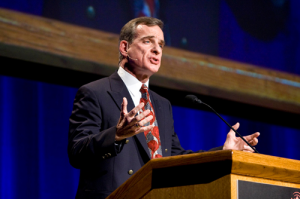This is a guest post courtesy of Dr. William Lane Craig, Christian philosopher, theologian, and founder of Reasonable Faith. Dr. Craig is Research Professor of Philosophy at Talbot School of Theology in La Mirada, California. You can follow Reasonable Faith and Dr. Craig on Facebook and Twitter and access articles, podcasts, and other resources for defending the Christian faith at www.reasonablefaith.org. He and his wife Jan have two grown children.
This post is a response to a CNN.com post from a Texas mother entitled Why I Raise My Children Without God that has been viewed more than 750,ooo times.
 Jan and I raised our kids to believe in God, indeed, to believe in the Christian God.
Jan and I raised our kids to believe in God, indeed, to believe in the Christian God.
Why? Because we wanted to teach them the truth.
For the same reason, Jan and I did not lie to our children about Santa Claus.
We told them that Santa Claus (or Père Noël, as they were raised in Belgium) was a fun, make-believe figure we could pretend brought presents around Christmas time. It was all in good fun, and no big deal. Christmas was mainly about the birth of a historical person who really lived, Jesus of Nazareth, who revealed to us what God is like, died for our sins, and rose from the dead.
We were prepared at the drop of a hat to discuss the reasons why we believe these things, should they want to ask. No question was off limits, and open inquiry was encouraged.
We think Christianity is true. So how could we not teach our children about it? That would be the worst form of child abuse conceivable, to try to shield one’s children from the love of God and eternal life.
The fundamental mistake of the mother who wrote the column is thinking that when “we raise kids without God, we tell them the truth.” Do we? I think, on the contrary, that we thereby lead them astray into falsehood.
The whole question, then, is: is Christianity true?
Is Christianity True?
Well, what reasons does this mother offer for thinking that it is not? Let’s look at them briefly one at a time:
God is a bad parent and role model.
This charge assumes that God is supposed to serve as a model for parenthood. But while there are analogies between God as our heavenly Father and a human parent, the disanalogies are so great as to undermine the assumption that God is to serve as a role model for human parents. For one thing, the analogy should be between us and our adult children, and in that case we do let them make their own free decisions without interference.
But even then the analogy is not tight. For we and our children are equals; but God is our Creator and Sovereign. A human father who thought of himself as the end-all of his children’s existence would be egomaniacal. But the infinite God, who is the locus of goodness and love, is the appropriate end of all beings (even of Himself!), the summum bonum (highest good).
I am charged with the moral and spiritual education of my children; but God is involved in drawing all people freely to a saving knowledge of Himself. It is not at all improbable that only in a world suffused with natural and moral evil would the optimal number of people freely come to know Him and His salvation. I am bound by certain moral obligations and prohibitions vis à vis my children (e.g., not to harm them); but God (if He has moral duties at all) is not bound by many of these (e.g., He can give and take life as He pleases). God may ask me to bear terrible suffering (though not without recompense!) in order that others might freely find eternal life.
God is not logical.
This mother is obviously not aware that the logical version of the problem of evil is recognized as bankrupt even by atheist and agnostic philosophers today. (See the discussion of the problem of evil in my Philosophical Foundations for a Christian Worldview.) When we say that we do not understand why God has permitted a specific instance of suffering, it is not because we refuse to “think about it or deal with the issue.” Rather it is because we recognize that we are not in a position to make with any sort of confidence guesses as to why God permitted this specific incident. His morally sufficient reason for allowing some instance of suffering might not emerge until hundreds of years from now or perhaps in another country.
Every event sends a ripple effect through history such that its consequences are impossible for finite persons limited in time and space to predict. Thus it is the better part of intellectual humility to say that we do not know the specific reason why God permitted some instance of suffering. What we can show is that the occurrence of such suffering is neither inconsistent nor improbable with respect to God’s existence, as the atheist presumptuously asserts.
Obviously, no one is advocating that we should abdicate our responsibility for mitigating or eliminating the evils that afflict our world. On the contrary, Christians have led the way in the fight against slavery, poverty, disease, ignorance, and the manifest evils of our world. What have atheists done for us lately?
God is not fair.
This is just childish whining. Life is not fair. Get used to it. God is not under any obligation to be “fair.” (God is not Santa Claus, remember?)
That does not imply that God allows “luck to rule mankind’s existence.” No, it is God’s sovereign providence that rules the affairs of men. God neither promises nor provides an equal lot in life to every human being. What God does do is give sufficient grace for salvation and eternal life to every person He creates. The inequities and shortcomings of this life are not even worth comparing with the glory that God will bestow upon us in heaven. He sovereignly orders the world so that His plans will be achieved, and we can trust Him to do what is good.
God does not protect the innocent.
Right! Nor is He under any obligation to do so. He did not protect His only son Jesus Christ, who was the most innocent of men, from the horrible death on the cross. But God rightly orders the world so as to achieve His good purposes for the human race. Christ’s innocent death, in particular, brought about the redemption of mankind.
God is not present.
How do you know? Because we “cannot see, smell, touch or hear” God? If you could, he would be a finite, physical object, an idol, in effect, not God. Modern physics teaches us that there all sorts of realities that are not accessible to the five senses (QoW #273). Should we not believe in them? But we have indirect evidence of their reality, you might say. Indeed, and in the same way we have similar evidence for God.
God Does Not Teach Children to Be Good.
This is not an argument against God’s existence but just an alleged reason not to teach your children about God. I agree that we should teach children to do what is right because it is right. But the reason it is right is because God commands us to do it.
By contrast on atheism there is no basis for moral obligation or prohibition. It’s wonderful that this mother wants to teach her children to do what is right, but on naturalism there is no objective right or wrong. If her children eventually see through the sham, they may become relativists in spite of her. She can only hope that they will “make her proud” and “become decent people” because once they see through the baseless morality she has taught them, there’s no reason that they should do so.
God Teaches Narcissism.
What nonsense! Jesus taught us not only to love our neighbors as ourselves but even to love our enemies. I challenge anyone to produce even one psychological study showing Christian children to be narcissistic. To the contrary, a number of studies show religious people to be psychologically better-balanced and happier than non-religious people.
Finally, although this mother claims that she doesn’t want religious belief to disappear from people’s private lives, the thrust of her whole column is quite the opposite. She already has the freedom to teach her children whatever she wants. So what more is she angling for?
She wants to convince readers of her column not to teach their children to believe in God. In other words, she is trying to eliminate religious belief in the private, not merely public, sphere. She is thus a part of the aggressive New Atheism.












